ASUS Transformer Book T100 Review: Redefining the Entry-Level Windows Notebook
by Anand Lal Shimpi on October 18, 2013 12:00 AM ESTCPU Performance
The Atom Z3740 in the T100 features a 9% lower base clock and 22.5% lower max turbo frequency than the Z3770 we previewed back at IDF. Given how good of a job Bay Trail does turboing up to max frequencies under normal use, I’d expect proportionally lower scores in our tests.
I’ll start with our cross platform browser based benchmarks before moving on to a look at the Z3740 vs. Z3770.
Note for all of these benchmarks I’ve used Google’s Chrome browser. IE11 integrates well into the modern UI of Windows 8.1 but is otherwise a pretty terrible browser by comparison. I think the modern UI Chrome experience on 8.1 isn’t as good, but it’s a better/faster/less-finicky option. Out of all of our tests only SunSpider seems to run quicker under IE11, whereas Chrome wins everywhere else. I think it’s a bit insane to switch between browsers based on the benchmark being run, so we’re sticking with Chrome across the board.
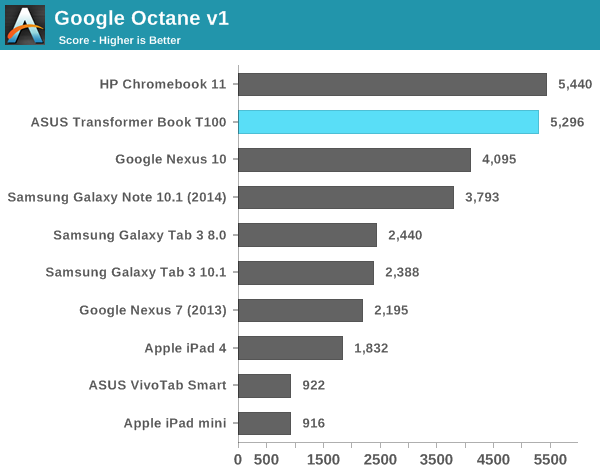
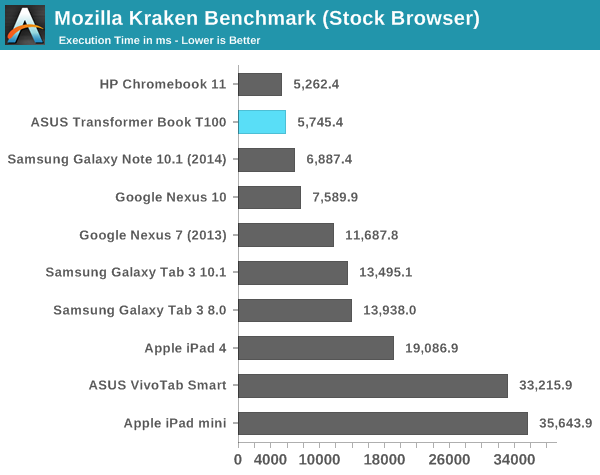
Lightly threaded performance is actually quite comparable to the Chromebook 11, which was a bit surprising. Throw a multitasking workload at the two notebooks and you'll separate the boys from the men though:
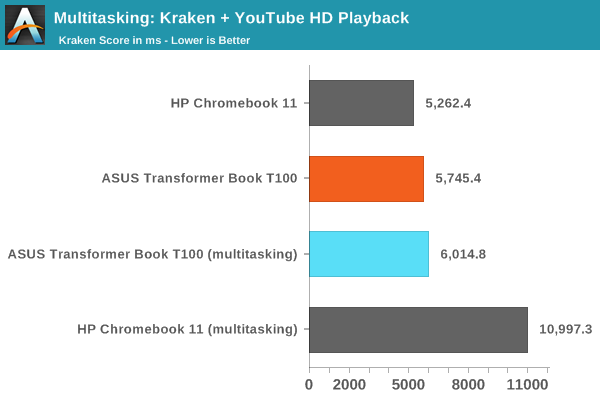
Chrome under Chrome OS performs extremely well for obvious reasons. But here the T100's additional cores and solid memory interface really come in handy when multitasking, there's hardly any performance penalty for this sort of multitasking on Bay Trail while the dual-core Cortex A15 based Chromebook needs serious help.
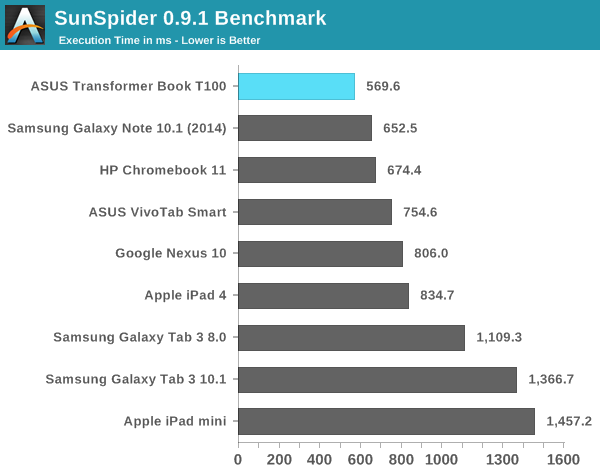
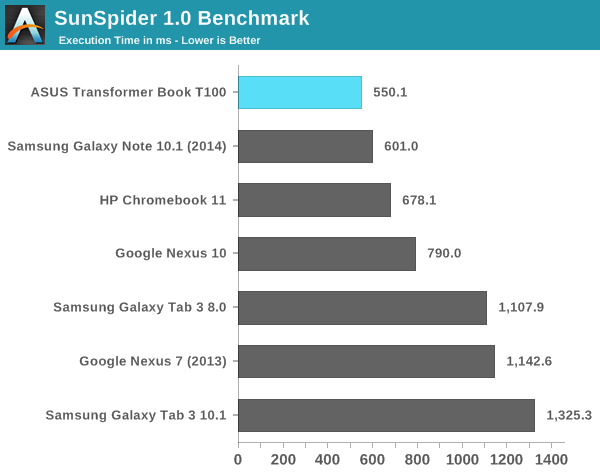
The T100 remains extremely competitive compared to the Chromebook 11 and definitely compared to Android tablets.
Next up is putting the Atom Z3740's performance in perspective compared to our earlier FFRD data:
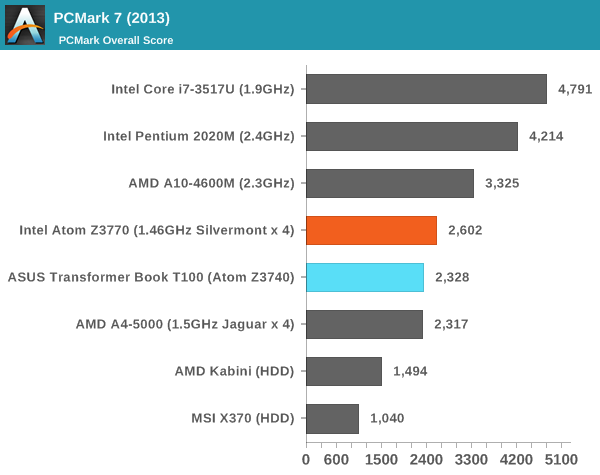
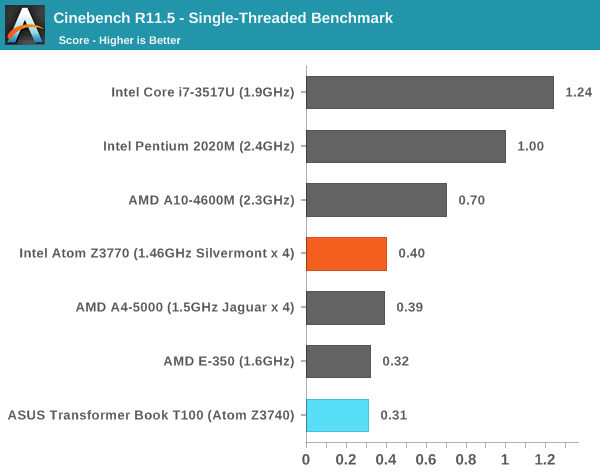
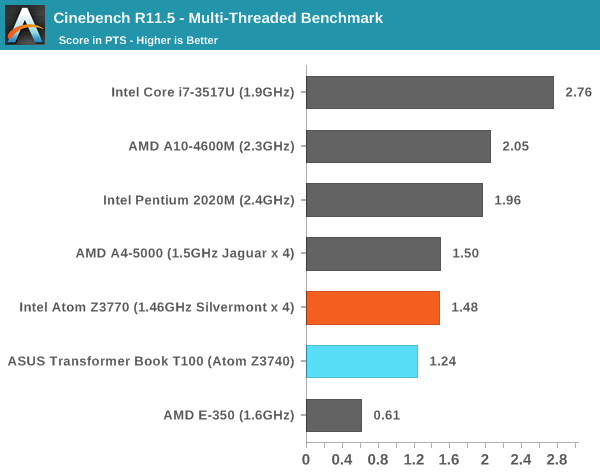
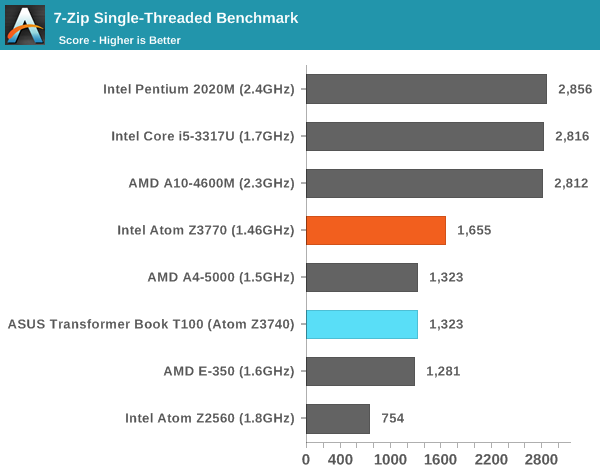
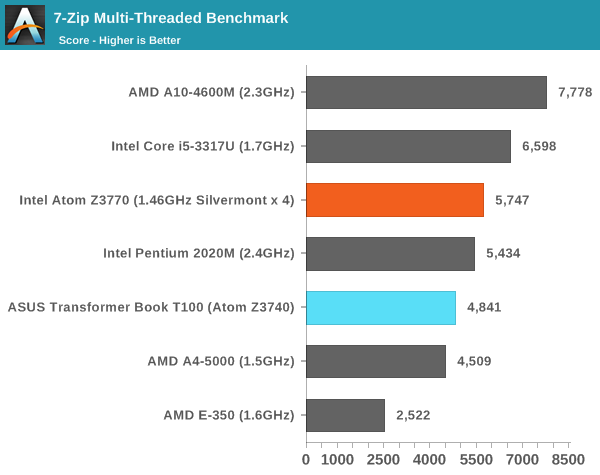
In all of these tests we see nearly perfect scaling compared to the Atom Z3770. Turbo frequencies are regularly hit when under load, and as a result see see proportionally lower performance from the T100. I would’ve liked to have seen the Z3770 used in the T100, but not if it meant a higher price, an optional dock or a worse display.
GPU Performance
I didn’t have a ton of time to go through gaming performance on the T100, but with a quarter of the EUs of Ivy Bridge it’s clear that you shouldn’t expect a GPU monster out of Bay Trail. In our cross platform graphics tests however the T100 is quite competitive, although not industry leading by any means.
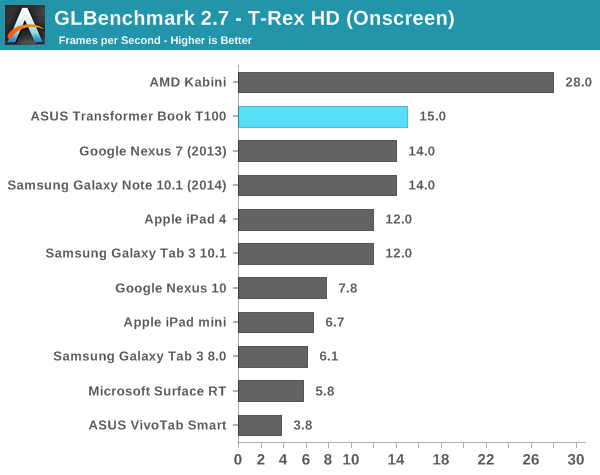
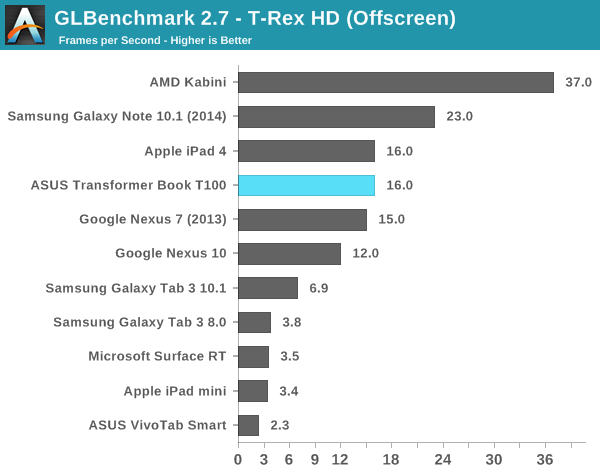
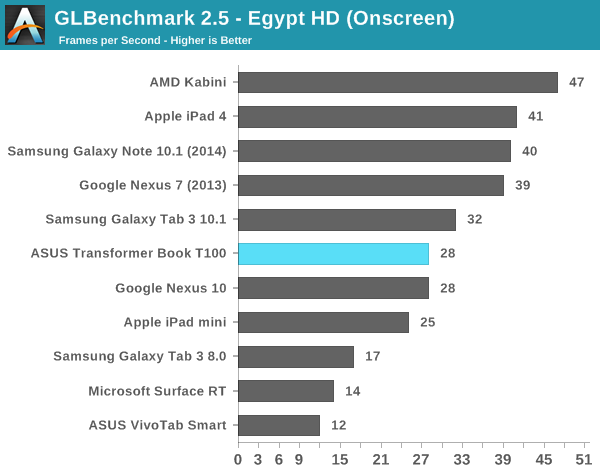
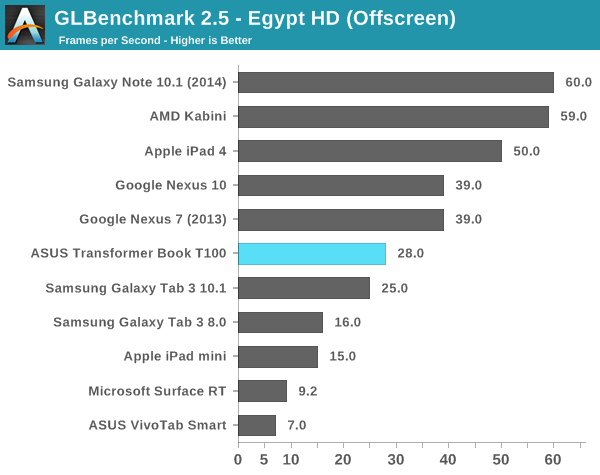
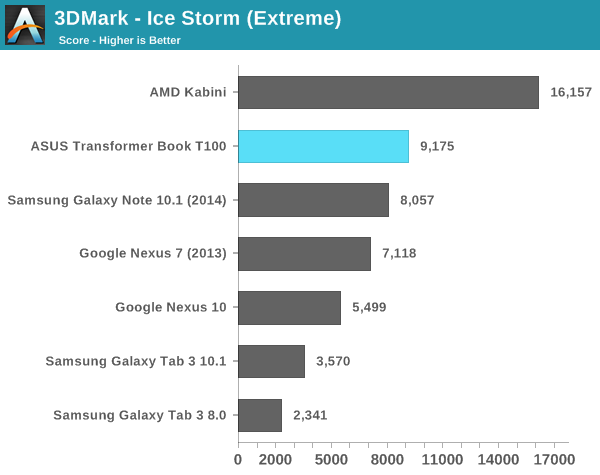
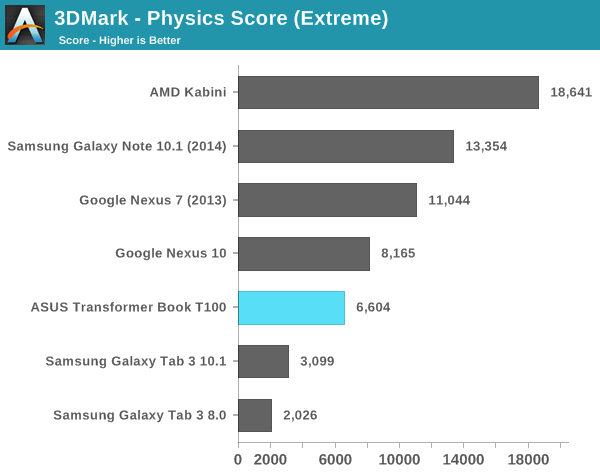
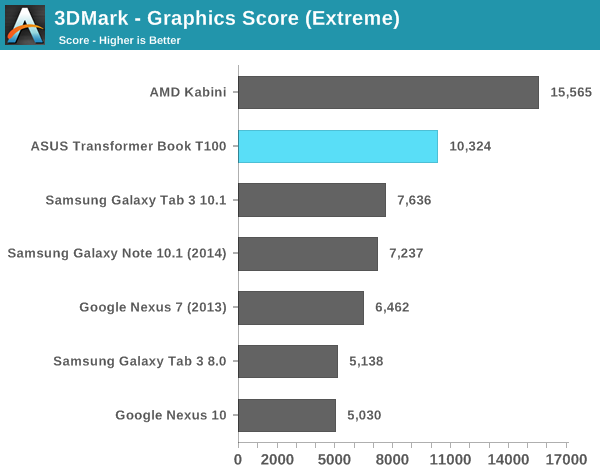
I did see some choppy animations at times and indications that the GPU (or its drivers) weren’t up to snuff, but that’s exclusively in classic desktop mode. In the modern UI, the Atom Z3740 was very smooth.
Storage Performance
Our Android IO tests rely on Androbench with a relatively limited LBA span. I increased the difficulty of the test a bit under Windows 8.1 but still kept it reasonable since we are dealing with eMMC solutions. I’m testing across a 1GB LBA span and testing for a period of 1 minute, which is an ok balance between difficulty of workload and sensitivity to the fact that we’re evaluating low-class SSDs here.
Sequential read and write performance is competitive with the high-end examples we’ve seen in the Android space. Random read performance is similarly good, while random write performance is appreciably better than what we’re used to in Android tablets. It is good to see ASUS/Intel/Microsoft concerned about random write performance, but I’d still like to see a 5 - 10x increase in these numbers with a focus on sustained performance before I’m truly happy.
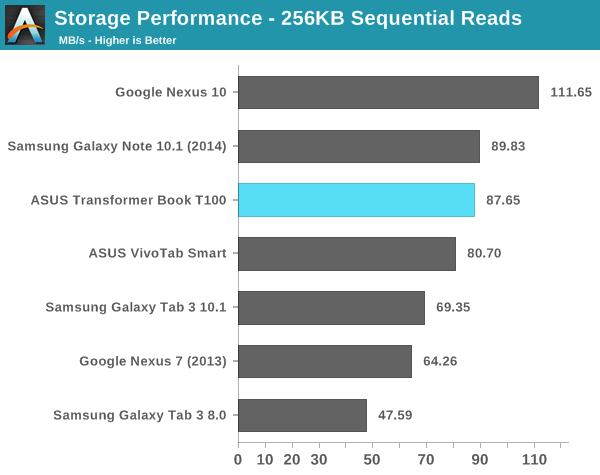
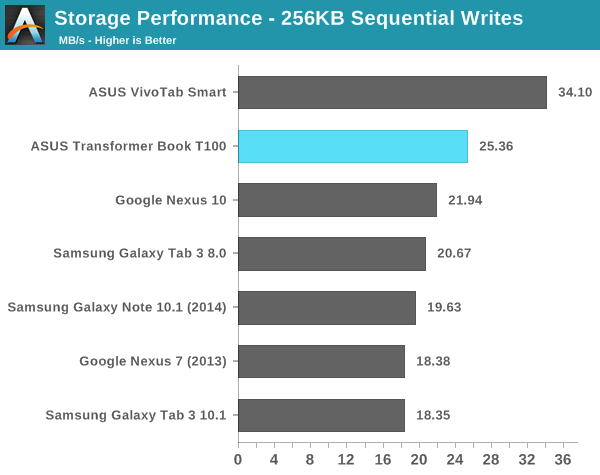
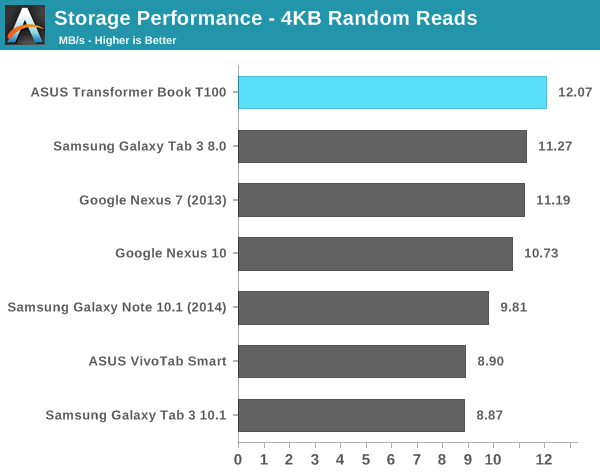
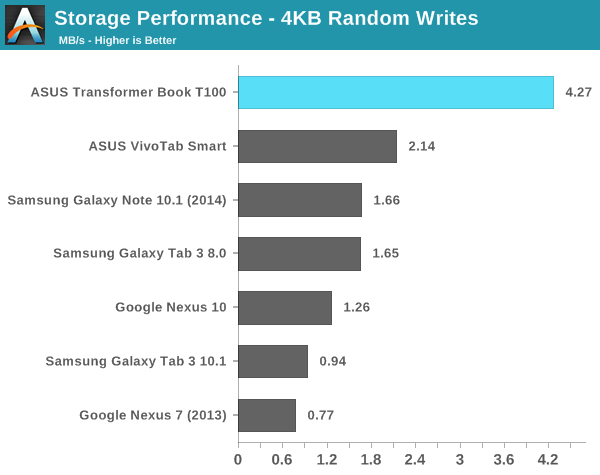










158 Comments
View All Comments
ssiu - Friday, October 18, 2013 - link
Intel's listed price: Z3740 $32, Z3770 $37.Like I said in an earlier thread, why are companies sacrificing ~20% performance to save $5? I'll glaqdly pay $10 more for the higher performance of Z3770. :mad:
boeush - Friday, October 18, 2013 - link
It's probably less about the price/margins, than about TDP and battery life/size/cost/weight.FwFred - Friday, October 18, 2013 - link
The Z3770 is probably similar in battery life/size/cost/weight. I'm guessing price points was the key. It would have been nice to offer the 64GB version with the upgraded CPU.DanNeely - Friday, October 18, 2013 - link
Intel listed them both as 2W SDP parts; so battery life probably isn't going to differ much between them (and not just because the screen is probably drawing more power than that).tential - Friday, October 18, 2013 - link
This margin thing is killing me as well man. They're doing a TON to make 5 extra dollars. I know that 5 dollars over 1000s of units may turn into $100k, but this is why Apple does better than these OEMs sometimes.Apple knows their software in and out and makes sure the laptop they produce can run it in all scenarios the AVERAGE user will use it in.
These OEMs make a laptop to hit a pricepoint, and make their profit margin and don't care about performance at all. It's why people will get a bad perception of their company.
"I bought Asus laptop and it was cheap, but it also sucked!!!!"
Releasing a product that barely does it may seem good for short term but hurts longterm perception of the company to the average consumer who doesn't care about hardware and just expects everything they purchase to work.
double88 - Sunday, November 10, 2013 - link
Asus laptops are generally pretty solid. Much more so than other OEMs. Apple's products are more polished, yes, but Asus is probably second best.theduckofdeath - Saturday, October 19, 2013 - link
The new SDP rating is a bit of a mess. It's lower than TDP ratings as it takes an average including light usage like web browsing. This surely means that a processor with a higher burst performance will get a much lower rating. I guess that the high-end iteration of the new Atom simply was found to draw too much power under load for them to be happy with it.timon_comment - Saturday, October 19, 2013 - link
Waiting a look in Bay Trail M + SATA, PleaseNote, Atom Bay Trail T is still no support SATA and PCIe.
in Windows x86 OS I dislike the eMMC storage system, it is an execrable design, the heavyweight Windows x86 OS is fully unlike in the lightweight Android OS.
Windows needs SATA and PCIe, but Atom Bay Trail T is still no support SATA and PCIe.
Intel actually wanted in Android to compete with ARM processor, does not really want Bay Trail T to help Windows tablet to compete market, because the x86 processor is almost no another competitor! Now is merely Intel wanted to control the Android market!
zeo - Sunday, October 27, 2013 - link
The older v4.41 specification eMMC drives are pretty slow but they're starting to improve... Newer models can now take advantage of the newer v4.5 specification that doubles the max bandwidth and introduces RAM based cache memory to significantly boost eMMC performance.They'll still be a lot slower than a modern SSD but at least not slower than a HDD anymore...
And the next bump in performance will be out early next year with the next version update for eMMC that allows for a little better than SATA II performance finally...
Mind, eMMC is a single chip design and SSDs are multiple chips... So it's harder to get performance from a single chip but they're slowly getting there...
MagickMan - Friday, October 18, 2013 - link
I would have gladly paid $370 for the same package with a Z3770. Too bad, I guess I'll wait for the next one and see what it's like.